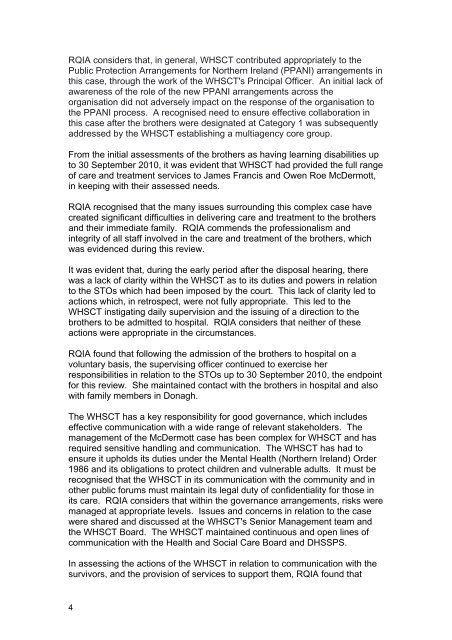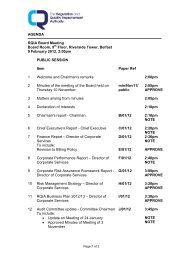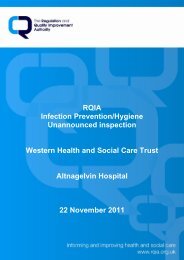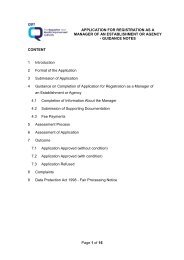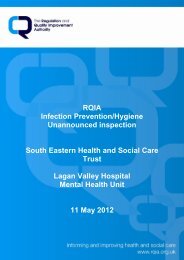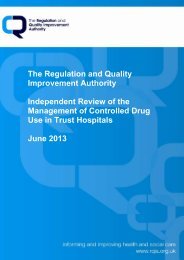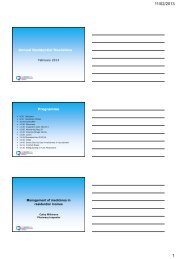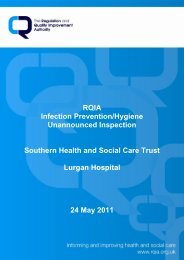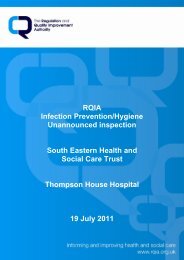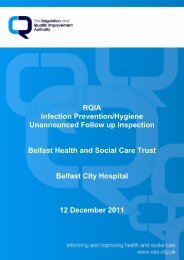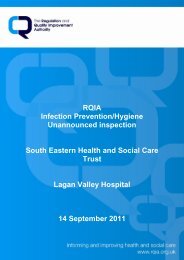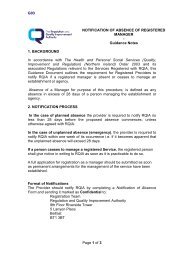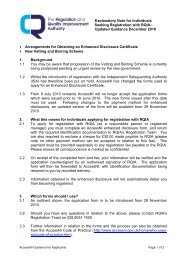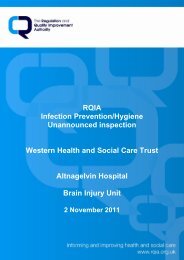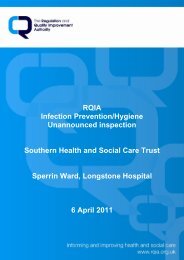RQIA Independent Review of The McDermott Brothers' Case
RQIA Independent Review of The McDermott Brothers' Case
RQIA Independent Review of The McDermott Brothers' Case
You also want an ePaper? Increase the reach of your titles
YUMPU automatically turns print PDFs into web optimized ePapers that Google loves.
<strong>RQIA</strong> considers that, in general, WHSCT contributed appropriately to the<br />
Public Protection Arrangements for Northern Ireland (PPANI) arrangements in<br />
this case, through the work <strong>of</strong> the WHSCT's Principal Officer. An initial lack <strong>of</strong><br />
awareness <strong>of</strong> the role <strong>of</strong> the new PPANI arrangements across the<br />
organisation did not adversely impact on the response <strong>of</strong> the organisation to<br />
the PPANI process. A recognised need to ensure effective collaboration in<br />
this case after the brothers were designated at Category 1 was subsequently<br />
addressed by the WHSCT establishing a multiagency core group.<br />
From the initial assessments <strong>of</strong> the brothers as having learning disabilities up<br />
to 30 September 2010, it was evident that WHSCT had provided the full range<br />
<strong>of</strong> care and treatment services to James Francis and Owen Roe <strong>McDermott</strong>,<br />
in keeping with their assessed needs.<br />
<strong>RQIA</strong> recognised that the many issues surrounding this complex case have<br />
created significant difficulties in delivering care and treatment to the brothers<br />
and their immediate family. <strong>RQIA</strong> commends the pr<strong>of</strong>essionalism and<br />
integrity <strong>of</strong> all staff involved in the care and treatment <strong>of</strong> the brothers, which<br />
was evidenced during this review.<br />
It was evident that, during the early period after the disposal hearing, there<br />
was a lack <strong>of</strong> clarity within the WHSCT as to its duties and powers in relation<br />
to the STOs which had been imposed by the court. This lack <strong>of</strong> clarity led to<br />
actions which, in retrospect, were not fully appropriate. This led to the<br />
WHSCT instigating daily supervision and the issuing <strong>of</strong> a direction to the<br />
brothers to be admitted to hospital. <strong>RQIA</strong> considers that neither <strong>of</strong> these<br />
actions were appropriate in the circumstances.<br />
<strong>RQIA</strong> found that following the admission <strong>of</strong> the brothers to hospital on a<br />
voluntary basis, the supervising <strong>of</strong>ficer continued to exercise her<br />
responsibilities in relation to the STOs up to 30 September 2010, the endpoint<br />
for this review. She maintained contact with the brothers in hospital and also<br />
with family members in Donagh.<br />
<strong>The</strong> WHSCT has a key responsibility for good governance, which includes<br />
effective communication with a wide range <strong>of</strong> relevant stakeholders. <strong>The</strong><br />
management <strong>of</strong> the <strong>McDermott</strong> case has been complex for WHSCT and has<br />
required sensitive handling and communication. <strong>The</strong> WHSCT has had to<br />
ensure it upholds its duties under the Mental Health (Northern Ireland) Order<br />
1986 and its obligations to protect children and vulnerable adults. It must be<br />
recognised that the WHSCT in its communication with the community and in<br />
other public forums must maintain its legal duty <strong>of</strong> confidentiality for those in<br />
its care. <strong>RQIA</strong> considers that within the governance arrangements, risks were<br />
managed at appropriate levels. Issues and concerns in relation to the case<br />
were shared and discussed at the WHSCT's Senior Management team and<br />
the WHSCT Board. <strong>The</strong> WHSCT maintained continuous and open lines <strong>of</strong><br />
communication with the Health and Social Care Board and DHSSPS.<br />
In assessing the actions <strong>of</strong> the WHSCT in relation to communication with the<br />
survivors, and the provision <strong>of</strong> services to support them, <strong>RQIA</strong> found that<br />
4


